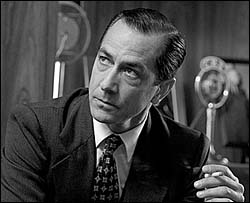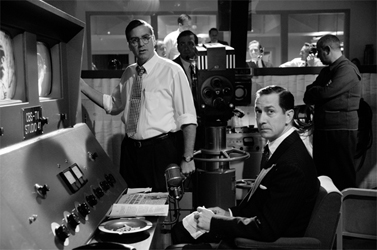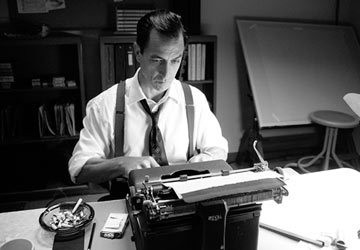

|
Good Night And Good Luck
6 out of 10 |
 |
|
"We will not walk in fear, one of another" Many remember the tension-filled years when, during the 1950's, US Senator Joseph McCarthy with the Senate Permanent Subcommittee on Investigations, conducted inquiries involving members of the public fearing the spread of Communisim. Blacklisting dozens of actors and writers such as Arthur Miller, Desi Arnez and Alfred Kinsey, McCarthy attacked institutions from the US military to the press. In "Good Night and Good Luck" this era is revisited and beautifully reconstructed in black and white with a moving story based on the confrontations between McCarthy and broadcast journalism founder and CBS correspondent Edward R. Murrow. Directed and written by actor George Clooney, he makes an impacting statement by re-examining both the importance of the honest direct journalism of the 1950ıs and of the dangers of misuse use of power by political institutions. Back in a simplier age, and in the fledgling days of radio and television, American journalist and North Carolina native Edward Murrow returned to the US from London where he was employed by European offices of CBS in radio and as an overseas war correspondent during WWII. Involved in the creation some of the first programs for both radio and tv such as See It Now and Person to Person, he was integral in helping to lay the foundation, if not the ground rules for news journalism. Strongly believing in justice and not afraid of confrontation, he openly confronted Senator McCarthy, following the dismissal of US Air Force lieutenant Milo Radulovich on charges of Communism. The picture opens at this point and brilliantly covers some of the events of this period and Murrowıs defense of honesty, freedom of speech and his belief in the importance of protecting the American public against a "witchhunt" that by 1955, was spinning out of control. Supported by his co-workers at CBS, who also appear, including Don Hollenbeck (played by Ray Wise), Fred Friendly (George Clooney) and CBS producer William Paley (Frank Langella), it is a story that lacks the obvious action typical of Hollywood, yet nonetheless contains a powerful message through the bravery of a few men, as they risked their careers and reputations against the threats of those around them who were destroying the very freedoms they proclaimed to defend. Morrow's attacks helped to strengthen the resolve of many Americans who were becoming increasingly adverse to the oppressive fear filled atmosphere and hoping for a return to the freedom and heady days of the American dream. Similar to the ransacking of constitutional rights following September 11, Morrowıs actions hold a message relevant to today - "we cannot defend freedom abroad by deserting it at home." The story is clearly one the production team believed in passionately, with many of them having more than a passing gripe or an axe to grind with authority - George Clooney being a scientologist and Robert Downey Junior having had a long record of prosecutions and jail sentences for his cocaine addition. While it has with rich black and white and grey scale tones similar to "Sky Captain" or "Road to Perdition" and captivating editing by Stephen Mirrione ("Oceanıs 11"), the picture at times seems more like a music video and the script more of a metaphor than a story and more suited to a play. Clooney, also while capturing the essence of Morrow's speeches, gives too shallow a portrayal of the events and the lives of the people of the era. Wandering and ending abruptly, the picture conveys a strong message but doesn't expand on it or place it in any context. Centering mainly around Murrow's broadcasts and historical footage of McCarthy himself, it misses out on the importance of one of Americaıs most famous broadcasters. Most haphazard is the relationship between CBS reporters Joe (Robert Downey Jr.) and Shirley Wershba (Patricia Clarkson). Too bland to be central to the story and with the characters speak in tones that seem to have been stolen from Casablanca, it is too weak to be central to the story and doesnıt seem to have much of place until the final scenes.Thankfully however, outside of sometimes confusing editing and a rather disjointed story, the performances, particularly David Strathaim in the role of Edward R. Murrow and Jeff, are impressive. Clooney, believing that "famous people shouldnıt be played by famous people," chose Straitham for the role in a unique move, allowing for a strong portrayal of the journalist without focusing on the actor as the star. As in "V for Vendetta", however, for "Good Night and Good Luck" it is the degree to which the director takes us to another world that has the impact, but the similarity to our own that does. As ordinary work-a-day characters express concerns over the violtions of civil rights such as loss of habeus corpus and conviction without trial, it is as if they could be ourselves describing the current political climate in the USA and the world that carries a veiled message of outrage with as much punch as if we have found another member of the audience dead in their seat beside us in the cinema. Murrow was no "Commie-subversive" but a man recognized as a brave American hero who continued to broadcast in the face of totalitarianism regardless of personal risk as the Nazi's stormed Austria and the bombs fell in London and his fine speeches against McCarthyism, taken from his original text, in this timely picture, they stand as true and powerful today as then.
Film Critic: Jennifer M Lillies   |
|